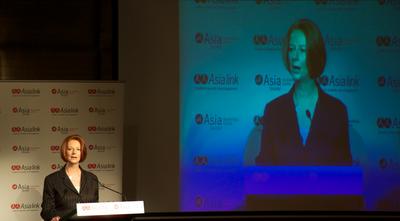The Gillard speech changes the fundamental premise of the debate about Australia’s place in the world. The White Paper will provide a comprehensive review of economic and strategic change in Asia and its implications and opportunities for Australia. It will involve whole-of-government input, external expert advice and broad consultation across the community.
In Asia’s emergence in the 21st century we are experiencing changes of ‘type, not degree’, as Gillard says.
The big story is China and its rapid rise. ‘When Great Britain industrialised’, Gillard reminds us, ‘it took seventy years — the whole period from 1830 to 1900 — for its economy to quadruple’. That had a major impact on the world. By comparison, ‘[i]n the last twenty five years the economy of China, a nation of 1.3 billion, has grown by a factor of twenty’.
And India is not far behind. India has a more favourable demographic structure than China and, on its current track, the Indian economy could become larger than the US economy by mid century and larger than China not long after that.
China and India are committed to industrial catch-up and, given this, they will likely continue to grow at around their current trajectories, albeit with some bumps along the way. Both countries’ huge population sizes, the simple arithmetic tells us, means that their economies will become bigger than the established industrial powers before their people become as rich as them.
Australia’s immediate neighbour Indonesia is now a larger economy than Australia’s in purchasing power parity terms and already the 15th largest economy in the world, growing at 6 per cent a year — a rate many would consider below potential. The transition to democracy and having the world’s largest Muslim population makes Indonesia a key player in global affairs. It is safe to predict the continued growth in Indonesian power, influence and importance.
And Japan continues to be an important player as the world’s third-largest economy, but faces big challenges. Japan’s quandaries include dealing with a shrinking population and workforce, escaping from economic stagnation, reconstruction after the Tohoku earthquake, tsunami and Fukushima nuclear meltdown, and, perhaps most importantly, managing the fact that its largest economic partner (China) is different from, and a potential strategic competitor with, its security ally (the United States).
Gillard states bluntly that ‘these relationships (with our neighbours) will not manage themselves’.
It is 22 years since Ross Garnaut delivered the report on Australia and the Northeast Asian Ascendency that shaped and guided Australian policy strategies towards its northern neighbours through the 1980s and 1990s. Now Gillard has broadened the scope of the newly-commissioned White Paper to the whole of Asia, including India and Southeast Asia.
Many countries around the region are grappling with the issues that Australia has now chosen to confront explicitly. Australia needs a framework and vision to manage the issues of today in a coherent manner that deals with the issues of tomorrow. It needs to re-think not only its foreign policies but a whole raft of domestic policies if it is to cope with the scale of the impact of what is going on in Asia on its economic, strategic, social, environmental and other interests. The stakes are high.
Hugh White has posed the big question about how Australia and the region might manage the political and security implications of the changes in economic and political power that are taking place in Asia between the United States and China. Gillard’s vision is for Australia to be ‘[s]trong in the Asian century — with an ally in Washington and respect in Beijing’.
Australia is the most important, stable supplier of strategic raw materials to the region, hence fueling Asia’s growth, and also plays a role in maintaining economic openness in the region. The key for Australia is to get its policy strategies right in dealing with its northern neighbours but also to play its role in developing effective regional economic and political security.
The White Paper is tasked with assessing how to achieve these important goals and the widely-respected former Secretary of Treasury, Dr Ken Henry, is a confident choice to map Australia’s future in Asia.
Gillard clearly states that we are not in the business of creating new institutions but that we need to build around the existing institutions and structures — ‘Groups with the right membership and mandate to address the full range of security, political and economic issues facing the region’. What is needed is a flexible but robust set of arrangements that keeps the Unites States engaged but allows the development of an agenda that takes account of broadening regional needs.
The immediate priorities are ‘working in the G20 to deal with structural imbalances, at APEC to open the region as a whole’ and working on building the EAS up as an institution since ‘[w]e’ve got the EAS off the starting blocks now but there’s a long race ahead’, as Gillard cautions.
Of Australia’s strategic environment, Gillard rightly concludes: ‘Australia hasn’t been here before’.
Governments in Australia in the past decade or two have not been willing to accept and to face the reality of the changes we face in our region front-on. Gillard is changing the game and taking up the challenge. Her call for a rethink and a new strategy on Australia’s engagement with Asia is an entirely positive development and has come not a moment too soon.
Shiro Armstrong is a Research Fellow at the Crawford School of Economics and Government, The Australian National University, and Editor of the East Asia Forum.

